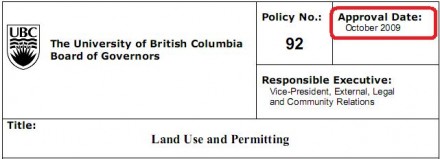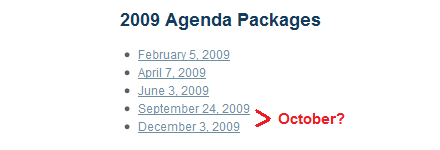Jan
11
Board of Governors Invents Secretive Voting Procedure
Posted by: Neal Yonson | January 11, 2010 | 15 Comments
Last fall, the Board of Governors gave its consent to UBC’s newest policy, Policy 92: Land Use and Permitting. Look closely at the top right-hand corner of the policy. The approval date listed is October 2009.
 .
.
.
One problem: the Board never met in October..
The creation of Policy 92 has brought to light a virtually unknown practice of the Board of Governors: e-mail voting using implicit consent. This is the method by which Policy 92 was passed while the Board had no scheduled meetings.
“When a motion is passed by consent that means nobody opposed, including the students, to not pass that,” explained Bijan Ahmadian, student Board rep. “What happens is that Reny [Kahlon, Board Secretary] sends out the e-mail and says ‘This is a consent item, does anybody want to call a meeting on this?’” If there are no responses received by a set deadline, it is considered to be passed.
The practice raises a number of concerns.
There is a distinct lack of transparency with e-mail voting. Business conducted outside of meetings via e-mail does not get recorded in agendas or minutes of the board. The Board Secretary confirmed that at the same time as the Board was created Policy 92, it also repealed Policy 116: Commercial Agreements Initiated by External Affairs and the Freedom of Information and Protection of Privacy Act. Without a word, the policy simply disappeared from UBC’s list of policies (but thankfully not from the internet archive sites).
It’s only a lucky side effect that the creation of Policy 92 resulted in a document that is posted publicly, including its approval date. Otherwise, this may not have come to light as easily. Many decisions made by the Board, if made by e-mail, would be rendered effectively invisible. It raises questions about the existence of other decisions made outside of regularly scheduled meetings and for which there exists no public record. Although it was mentioned that e-mail voting occurs irregularly, only board members can say for certain how often it occurs, and what items get dealt with in this way.
Secondly, it appears unlikely the Board even has the authority to approve things in this manner. When the Board Secretary was contacted about the legitimacy of e-mail approval, the following information was cited:
University Act, section 26(1): The Chair has the same right to vote as the other members of the Board. In the case of a tie vote on a motion, the motion is defeated, and the Chair must so declare.
A resolution in writing, signed by all of the Governors who would be entitled to vote on that resolution at a meeting of the Board, is as valid as if it had been passed at a meeting of the Board.
It would be an interesting question to consider whether implicit approval to an e-mail is equivalent to “a resolution in writing, signed by all of the Governors.” However, it’s a moot point because the information quoted above is incorrect. The second paragraph is not actually contained in the University Act! Everything in the Act suggests that the board must actually meet to conduct business.
There may be one argument made under section 27(2)(a) of the Act, which says the board has the power “to make rules for the meetings of the board and its transactions”. The Board’s procedures page says that “Additional meetings may be scheduled for urgent matters only,” but makes no mention of the practice of e-mail voting.
One last issue is that the reason e-mail voting was used is because they were considered “consent items.” Consent items occur when the decision has been made by another body (e.g. Senate) and the Board’s role is to rubber-stamp it. University policies are not consent items. The Board is the only source of approval to create or repeal these policies.
The practice is secretive, and more than likely not legitimate. The Board should be made to explain why these policy decisions were not made openly, and why records are not generated for these decisions.
The implications of each policy decision also have questionable motives behind them. Check back later for more details.
Please give us your support in the continuous VFM competition. It helps keep us motivated to continue digging up stories and bringing you exclusive, original reporting.
Comments
15 Comments so far






Excellent find. I have never seen this occur at the Senate level I have seen it at committee levels within the senate. I don’t feel as it is particularly untransparent though as the final motion still comes to the larger body.
Things only come to the Senate’s floor if they are category 1 changes however. Things like changing course numbers and course titles (among many others) are category 2 and don’t come to the senate’s floor. It is possible then that these cat. 2 changes would pass
This issue has been brought up before in different organizations, which is why it is specified in the Society Act (though I understand this is more applicable to the AMS rather than BoG) that if anything is decided on outside of a meeting, it must receive unanimous consent from the board in the form of each Director’s written agreement. Perhaps this needs to be looked at further, and a similar distinction made.
I bet that Mr. Bennett is very happy with Ahmadian’s support for secrecy and the lack of transparency and accountability. What else should we have expected? Bijan to be running on a slate with commerce students? Let’s just wait for their platforms.
Wow! is the Board trying to hide something???
Will students get together to take the right stand and bring such BoG corruption into a public investigation?
Some Q&A from Alex’s Facebook:
“Do you think this particular policy was kept under the radar because the BoG didn’t want a lot of land development talk getting out to students?”
The timing was quite deliberate. It was passed the exact same day as the Metro Vancouver bylaw was first discussed in a public meeting, as a sort of pre-emptive strike. There will be a post specifically dealing with the implications and timing of Policy 92 coming later this week.
“So… don’t we get an inside bro? Assuming they haven’t also explicitly outlawed putting these voting correspondances on record, I’d vote for whomever promises to pass them on. And if they have, I’ll raise their bad faith a motherfucking Blake Frederick. Swear to tetragrammaton.”
Yes, the 2 student board reps were obviously aware of this. I believe these items were originally considered “closed” (ie. confidential) and they were therefore not supposed to talk about it. The decision to make it a closed item is also highly questionable.
Blake Frederick and the AMS also knew of it shortly after it happened and we haven’t heard a peep yet. Presumably they have been “working on it” for the last 2.5 months, much like the YVR Add Fare.
Holy crap. The fact that such a procedure/policy exists seems unreal. I can understand an expedited way of passing certain motion, but this is absurd. At the very very least they have to keep and publish a record of those emails, especially if any debate went on. Then they have to post notice of what was or wasn’t passed in this manner.
Great catch guys.
I say Yonson and Lougheed for BoG.
I guess I’ll just second everyone above and say great job guys for bringing this out into the open. One thing though – Neal you mentioned that the AMS knew about this? Are you talking about council? As this is the first I heard of it (the policy sounds familiar, but the e-mail vote is news to me). Can you clarify for me, as it is possible that this was brought up when I wasn’t there?
Continuing on that thought, please don’t blame council for Tim’s oversight – the YVR add fare was not even on the radar of the External Policy Committee (probably because our Chair never called meetings), so we (as in councilors) certainly weren’t working on it. But hey, we’re not omniscient, so if a student like yourself wants us to take action on something, than I for one am only to happy to oblige, as I was that night.
That’s all, keep up the great work – UBC Insiders has been fantastic this year.
Tahara,
As far as I remember, this never came up in council (otherwise this post would have come earlier), though my attendance isn’t perfect either. But Blake knew (as well as some staffers) for certain. No idea on why he didn’t flag it as a problem.
And sorry for the YVR Add Fare comment, it was obviously not directed at council; they were responsive, unlike certain other people.
Hi all,
I did know about this issue a while back and have since been working with the Board Secretary for clarification on the operating procedures of the Board of Governors. I have not yet been provided with any operating procedures other than those outlined in the University Act. I have raised this instance of secretive voting with President Stephen Toope in my meetings with him as a concern and he has defended the practice claiming that the policy changes were available for public consultation for a month on the Board website before they were voting on through email.
May I inquire why this issue has been hidden until now, given that select members of the AMS Council (Bijan, Mike, Blake, and perhaps others) knew about it? The practice of e-mail voting and secretive ballot is extremely disconcerting.
Wait, the Board was voting in secret and Bijan did nothing? Big surprise. He doesn’t care about transparency at Board, only about furthering his own personal reputation with the Liberal appointees.
Bijan and his values are exactly what we do not need in the AMS right now.
Wait, the Board was voting in secret and Mike did nothing? Big surprise. He doesn’t care about transparency at Board, only about furthering his own personal reputation with the Liberal appointees.
Mike and his values are exactly what we do not need in the AMS right now
Like Blake could do better?
Questions like this are the reason why a lot of universities have the position of University Secretary.
See http://www.uvic.ca/universitysecretary/.
UBC has a Senate Secretariat and a Board Secretariat (as the article points out). This post concerns a decision of said secretariat and the Board it works for.
Myself, I’d be way more concerned that they’re using some bizzare trademark instead of the seal proper of the University…TUUM EST?
And as for calling RSBC 1996 c. 468 “the University Act”, that Act gives no such licence—there is no “this Act may be cited as the University Act” clause.
There is a Short Title Clause in British Columbia University Act, 1908…as well as a fancy seal at the top, unlike RSBC 1996 c. 468.